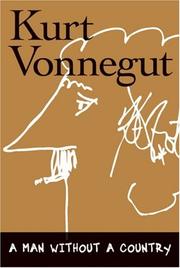Check nearby libraries
Buy this book

In a collection of brief autobiographical essays, the renowned novelist offers his views on art, politics, and everyday life in America. A Man Without a Country is Kurt Vonnegut's hilariously funny and razor-sharp look at life "If I die-God forbid-I would like to go to heaven to ask somebody in charge up there, Hey, what was the good news and what was the bad news?"), art ("To practice any art, no matter how well or badly, is a way to make your soul grow. So do it."), politics ("I asked former Yankees pitcher Jim Bouton what he thought of our great victory over Iraq and he said, Mohammed Ali versus Mr. Rogers."), and the condition of the soul of America today ("What has happened to us?"). Gleaned from short essays and speeches composed over the last five years and plentifully illustrated with artwork by the author in full color throughout, A Man Without a Country gives us Vonnegut both speaking out with indignation and writing tenderly to his fellow Americans, sometimes joking, at other times hopeless, always searching.
Check nearby libraries
Buy this book

Previews available in: English
Book Details
Edition Notes
Classifications
The Physical Object
Edition Identifiers
Work Identifiers
Source records
Scriblio MARC recordInternet Archive item record
marc_openlibraries_phillipsacademy MARC record
marc_openlibraries_sanfranciscopubliclibrary MARC record
Better World Books record
Library of Congress MARC record
Internet Archive item record
marc_columbia MARC record
marc_nuls MARC record
harvard_bibliographic_metadata record
Work Description
In questi dodici interventi (originariamente pubblicati sulla rivista radicale In These Times, poi snobbati dalla grande editoria americana e raccolti in volume da una coraggiosa casa editrice indipendente che negli Stati Uniti ne ha fatto un bestseller da 350.000 copie), Kurt Vonnegut ci offre il suo punto di vista sull'America e sul mondo di oggi. Traendo ispirazione di volta in volta da Mark Twain, Gesù Cristo, Abraham Lincoln e i socialisti di inizio Novecento, critica ferocemente il neoimperialismo e il capitalismo malato delle multinazionali, ma lo fa con uno stile frizzante e discorsivo che apre a continue digressioni: dalle dichiarazioni d'amore per il blues alle geniali riletture naif di Kafka e Shakespeare, dai ricordi del bombardamento di Dresda a quelli dello spinello fumato coi Grateful Dead, il tutto accompagnato da illustrazioni realizzate dall'autore stesso.
Community Reviews (0)
History
- Created April 16, 2010
- 17 revisions
Wikipedia citation
×CloseCopy and paste this code into your Wikipedia page. Need help?
| January 18, 2025 | Edited by MARC Bot | import existing book |
| March 7, 2023 | Edited by MARC Bot | import existing book |
| December 31, 2022 | Edited by MARC Bot | import existing book |
| February 16, 2021 | Edited by ImportBot | import existing book |
| April 16, 2010 | Edited by bgimpertBot | Added goodreads ID. |











